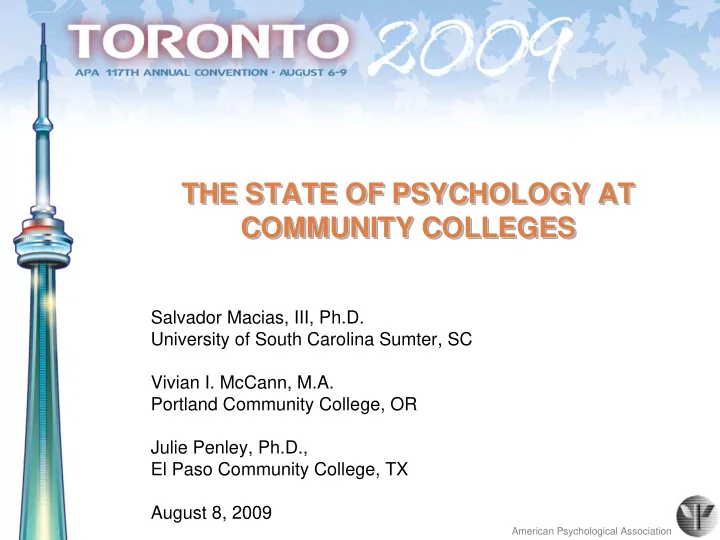

THE STATE OF PSYCHOLOGY AT THE STATE OF PSYCHOLOGY AT THE STATE OF PSYCHOLOGY AT COMMUNITY COLLEGES COMMUNITY COLLEGES COMMUNITY COLLEGES Salvador Macias, III, Ph.D. University of South Carolina Sumter, SC Vivian I. McCann, M.A. Portland Community College, OR Julie Penley, Ph.D., El Paso Community College, TX August 8, 2009 American Psychological Association
Acknowledgements: PT@CC Committee Members: Wynn Call, Ph.D., Mesa Community College, AZ (2008-10) Susan M. Franz, M.A., Highline Community College, WA (2009-11) Vince Granito, Ph.D. (Chair, 2008) Loraine County Community College, OH (2006-08) Salvador Macias, III, Ph.D. (Chair, 2009) University of South Carolina Sumter, SC (2007-09) Vivian I. McCann, M.A. Portland Community College, OR (2006-08) Julie Penley, Ph.D., El Paso Community College, TX (2008-10) Nancy Schaab, Ph.D. Delta College, MI (2007-09) Larry Venuck, Ph.d., Naugatuck Valley Community College, CT (2009-11) APA Staff: Martha Boenau Robin Hailstorkes, Ph.D. Jewell Beamon PT@CC Survey Sponsored in part by a Grant from APA American Psychological Association
Abstract In 2007-2008 APA’s Committee for PT@CC conducted a survey of community college faculty in the US. We utilized electronic listserves, addresses provided by the American Association of Community Colleges, APA’s data base, etc., to secure as wide a potential data pool as possible. Our survey sought information about faculty status (full time, adjunct status, other employment), educational level,demographics, work load (courses per term, campus and community service), courses taught, professional activity, teaching “style” (distance education, service-learning, learning communities, technology used), etc. We received over 1,800 responses representing over 600 community colleges. This presentation is a summary of these findings. American Psychological Association
PT@CC Survey of PT@CC Survey of Community College Faculty Community College Faculty 1,800 Responses to Survey 600 Colleges Represented 2500 Community Colleges in US American Psychological Association
Gender Distribution American Psychological Association
Ethnicity/Racial Distribution American Psychological Association
Education Level American Psychological Association
Primary and Secondary Employment American Psychological Association
Teaching Experience (Full time, years) American Psychological Association
Teaching “Facts” • 56% Teach 13 or more hours/week • 67% Classes with 20-40 students • 50% Teach distance courses • 36% Service learning • 25% Learning Communities American Psychological Association
Course Variability • 91% Introductory • 66% Developmental • 36% Abnormal • 20% Social • 15% Personality • 15% Human Sexuality • 14% Human Relations • 13% Educational • 11% Research Methods American Psychological Association
Professional Memberships American Psychological Association
Professional Activity • 90% Attend Professional Conferences • 43% Present at Conferences • 27% Research • 42% Professional Writing American Psychological Association
Community/Volunteer Involvement • 36% Community Presentations • 33% Public Schools • 31% Faith Based Organizations • 27% Special Populations • 22% Children/Youth Groups • 21% Boards of Directors • 9% Elderly/Hospice American Psychological Association
Community College Faculty Are: • Mostly White, • Mostly Female, • Relatively Young, •Teach a number of different psychology classes A fair number of them per term In a wide variety of ways With a variety of technologies To relatively small number of students •Are very active professionally •Are very active in their communities American Psychological Association
Thank You Salvador Macias, III, Ph.D. University of South Carolina Sumter, SC smacias@uscsumter.edu American Psychological Association
Recommend
More recommend